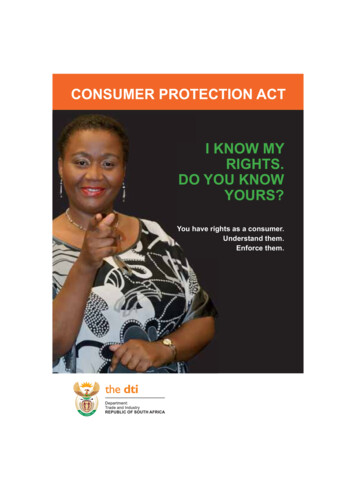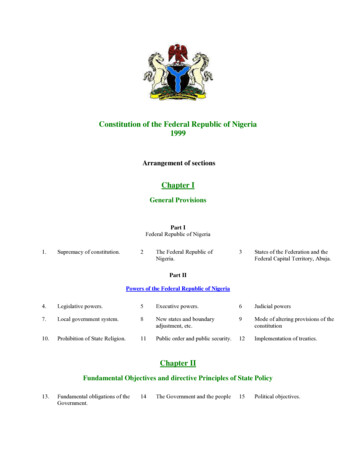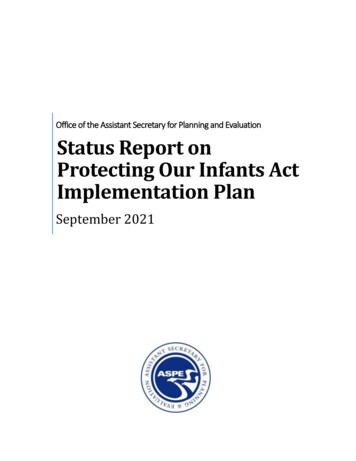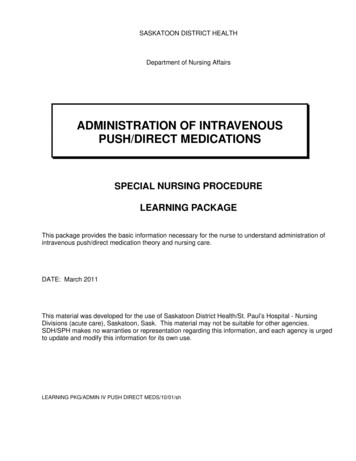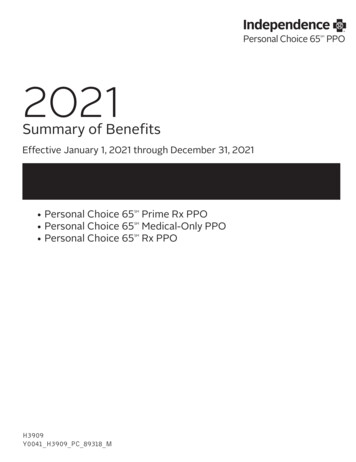
Transcription
AFRICAN HUMAN RIGHTS LAW JOURNAL(2014) 14 AHRLJ 580-608Protecting the right to personalliberty in Namibia: Constitutional,delictual and comparativeperspectivesChuks Okpaluba*Adjunct Professor of Law, Nelson Mandela School of Law, University of FortHare, South AfricaSummaryAlthough the recent Supreme Court of Namibia cases of Alexander vMinister of Home Affairs & Others and Gawanas v Government of theRepublic of Namibia were not merely decided under the CriminalProcedure Act 1977 (Namibia), but in terms of special statutes, namely,the Extradition Act 11 of 1996 and the Mental Health Act 18 of 1973respectively, they nonetheless involved the determination by the Court ofthe individual right to personal liberty in terms of article 7 of theConstitution of Namibia of 1990, thus bringing the Court face to facewith balancing the right to personal liberty against the public interest inthe enforcement of the law. Alexander could properly be described asconsisting of two parts: the trial judge’s treatment of the limitation clausein the Namibian Constitution, which survived on appeal, and the SupremeCourt judgment which turned on the problem of granting bail in thecircumstances of extradition proceedings. While Gawanas is a classicillustration of bureaucratic negligence, both cases involve the protection ofpersonal liberty of the individual as against legislative interference andinfringement by the agents of state. The lesson emerging therefrom is thatthe protection of personal liberty under the Namibian Constitutionextends to persons, to citizens, foreigners within Namibia and to someonewith some form of disability. The other lesson emanating from this study isthat a person whose right to personal liberty or dignity has been infringedcan ventilate that breach by way of judicial review, contesting the legalityof the law or under the principles of administrative justice in theConstitution or the law of delict, alleging wrongfulness, fault and damage.*LLB LLM (London), PhD (West Indies); Okpaluba@mweb.co.za
RIGHT TO PERSONAL LIBERTY IN NAMIBIA581Key words: right to personal liberty; constitutional protection; ventilationthrough the law of delict; protection afforded to foreigners and personswith disabilities; bail in circumstances of arrest pending deportation;bureaucratic delay in releasing the President’s patient from detention1 IntroductionRight from the advent of Namibia’s independence 24 years ago, thecourts appreciated their role as the interpreter and guardian of theConstitution. They understood their interpretive role as one whichmust be exercised against the backdrop of the values enshrined in theConstitution – the supreme law1 – which was founded upon theprinciples of democracy, the rule of law and justice for all.2 They hadembraced that function with a liberal and purposive spirit such thatthe words of the Constitution, especially its fundamental rightsprovisions, should be given the widest possible meaning in order toprotect the greatest number of those rights.3 In particular, the courtswere quick to discern the insistence of the founders of theConstitution upon the protection of personal liberty in article 7;4respect for human dignity in article 8;5 the right of an accused personto be brought to trial within a reasonable time in article 12(1)(b);6and the presumption of innocence in article 12(1)(d).7The two recent judgments of the Supreme Court of Namibiafocused on in this article do not only maintain that liberal spirit in theinterpretation of the provisions relating to fundamental rights andfreedoms entrenched in the Constitution, but they also uphold in thatsame spirit the personal liberty rights of the individuals involved. InAlexander v Minister of Home Affairs & Others,8 the plaintiff sought toenforce his right to liberty through a declaration of theunconstitutionality of section 21 of the Extradition Act 11 of 1996.Gawanas v Government of the Republic of Namibia,9 as well, wascontested on the basis of an action in delict to enforce the plaintiff’s123456789Art 1(6) Constitution of Namibia 1990.Art 1(1) Constitution of Namibia 1990.Namunjepo v Commanding Officer, Windhoek Prison 2000 (6) BCLR 671 (NmS).S v Timotheus 1995 NR 109; Amakali v Minister of Prisons and Correctional Services2000 NR 221 (HC).Ex Parte Attorney-General: In re Corporal Punishment by Organs of State 1991 NR178 (SC); S v Sipula 1994 NR 41 (HC); S v Vries 1998 NR 244 (HC); Namunjepo(n 3 above).S v Amujekela 1991 NR 303 (HC); S v Heidenreich 1995 NR 234 (HC); 1998 NR229 (HC); S v Uahanga 1998 NR 160 (HC); Van As v Prosecutor-General 2000 NR271 (HC); Malama-Kean v Magistrate for District of Oshakati NO 2001 NR 268(HC); 2002 NR 413 (SC).Per Mahomed AJ, S v Acheson 1991 NR 1 (HC) 10B-C. See also S v Pineiro 1991 NR424 (HC); S v Van der Berg 1995 NR 23 (HC); AG of Namibia v Minister of Justice2013 (3) NR 806 (SC).2010 (1) NR 328 (SC).2012 (2) NR 401 (SC).
582(2014) 14 AFRICAN HUMAN RIGHTS LAW JOURNALrights to personal liberty and dignity, thus bringing to this discussionthe delictual dimension to the thriving personal liberties jurisprudencein the Namibian jurisdiction. This investigation is, therefore, structuredaround these two broad but overlapping divides: the constitutionaland the delictual perspectives of a personal liberties10 debate. Theuniversal nature of the problem of the interference by organs of statewith the rights to personal liberty and their protection by law compelsthe introduction of international and comparative dimensions to thediscussion. Meanwhile, none of the two cases chosen for analysisinvolved the more familiar issues of arrest with11 or without awarrant12 under the Criminal Procedure Act 51 of 1977; rather, theyconcern issues arising from special legislative measures where publicofficials, not necessarily the police, are empowered to exercise powersof arrest or detention capable of impinging upon the liberty of theindividual, such as arrest for the purposes of extradition in Alexander,and detention in a mental hospital of a mental patient as in Gawanas.2 Constitutional guaranteesThe Constitution stipulates, prescribes and protects the individual’srights to personal liberty and security of the person, while statuteconfers the power of law enforcement, crime prevention, suppressionand investigation on the police force, or other relevant agents of thenational executive. By their nature, the powers so conferred inherentlyimpinge upon the very rights guaranteed. In the face of the delicatebalance and apparent difficult situation, the Constitution tends toprovide the way forward by indicating how a court should approachthe matter of interpretation and the manner of reconciling orbalancing the conflict, having regard to the public interest, publicobjective, public safety and public morality.13 Suffice it to state at thisstage, first, that both the Constitution and statute are important10111213‘Liberty’, when used in its broad sense, tends to encompass what is commonlyand generally referred to as ‘civil and political rights’. But, when qualified with‘personal’, it somewhat narrows its scope and involves concerns primarily physicalliberty. In this context, it ‘consists of in the power of locomotion withoutimprisonment or restraint unless by due course of law, except those restraintsimposed to prevent commission of threatened crime or in punishment of crimecommitted, those in punishment of contempt of courts or legislative bodies or torender their jurisdiction effectual, and those necessary to enforce the duty citizensowe in defence of the state to protect community against acts of those who byreason of mental infirmity are incapable of self-control’. Ex parte Hudgins 86 W Va526, 103 SE 327 329.Secs 43 & 44 Criminal Procedure Act 51 of 1977.Secs 40(1)(a) & (b) Criminal Procedure Act 51 of 1977: De Jager v Government ofthe Republic of Namibia 2006 (1) NR 198 (HC) (arrest on reasonable suspicion).Take the Constitution of the Republic of Trinidad and Tobago 1976, which isworded somewhat differently from most of the typical Westminster-modelconstitutions of the 1960s (except sec 4 of the Lesotho Constitution 1993, whichis similarly closely worded). Sec 4 of that Constitution provides: ‘It is herebyrecognized and declared that in Trinidad and Tobago there have existed and shallcontinue to exist, without discrimination by reason of race, origin, colour, religion
RIGHT TO PERSONAL LIBERTY IN NAMIBIA583sources of individual protection in addition to the delict cause ofaction. Secondly, there is a considerable overlap between theconstitutional guarantees of individual liberties and security of theperson, on the one hand, and the common law cause of action, onthe other, since the underlying constitutional infringement forms thebasis for the wrongfulness and fault requirements for proving delictualliability in this era of constitutional-delict.14 In the absence of aconstitutional or statutory bill of rights in a given jurisdiction, thelitigants’ recourse to legal remedies is ostensibly confined to thecommon law claim for wrongful arrest, false imprisonment andmalicious prosecution, and the action will be brought under the lawof tort under the English common law15 or delict in a Roman-Dutchlegal system. However, where constitutional guarantees exist or a billof rights statute operates, actions can be brought under theconstitutional cause of action or the common law and relevantstatutory instrument(s). Quite apart from bringing the action underthe relevant constitutional or statutory instrument, the complainantcan plead a breach of the entrenched or statutory right(s), even wherethe primary cause of action is the common law. Experience shows thatlitigants allege breaches of constitutional or statutory rights as the131415or sex, the following fundamental human rights and freedoms, namely:- (a) theright of the individual to life, liberty, security of the person and enjoyment ofproperty and the right not to be deprived thereof except by due process of law;(b) the right of the individual to equality before the law and the protection of thelaw; (c) the right of the individual to respect for his private and family life.’ Sec 5then proceeds: ‘(1) Except as is otherwise expressly provided in this chapter and ins 54, no law may abrogate, abridge or infringe or authorise the abrogation,abridgment or infringement of any of the rights and freedom hereinbeforerecognised and declared. (2) Without prejudice to subsection (1), but subject tothis chapter and to s 54, Parliament may not (a) authorise or effect the arbitrarydetention, imprisonment or exile of any person; (b) impose or authorise theimposition of cruel and unusual treatment or punishment; (8) deprive a personwho has been arrested or detained (i) of the right to be informed promptly andwith sufficient particularity of the reason for his arrest or detention; (ii) of the rightto retain and instruct without delay a legal adviser of his own choice and to holdcommunication with him ; (iii) deprive a person of the right to such proceduralprovisions as are necessary for the purpose of giving effect and protection to theaforesaid rights and freedoms.’See eg C Okpaluba ‘State liability for acts and omissions of police and prisonofficers: Recent developments in Namibia’ (2013) 46 Comparative andInternational Law Journal of Southern Africa 184 197.The action in Lumba v Secretary of State for the Home Department [2011] 4 All ER 1(SC) was filed purely on the tort of false imprisonment without reference to theHuman Rights Act 1998 (UK). It was a case where the Secretary of State wasempowered by the 1971 Immigration Act to detain foreign national prisonersafter serving their sentence for the purposes of deportation. The majority of theirLordships held that the policy under which the applicants were held did not onlylack transparency, but was unlawful; hence, they were unlawfully detained andtheir claims for false imprisonment succeeded. See also Langley v Liverpool CityCouncil [2006] 2 All ER 202; Roberts v CC of Cheshire Constabulary [1999] 2 All ER326; Holgate-Mohammed v Duke [1984] 1 All ER 1054; Christie v Leachisky [1947] 1All ER 567.
584(2014) 14 AFRICAN HUMAN RIGHTS LAW JOURNALbasis for launching the action at common law.16 In any case, wherethe bill of rights exists as an entrenched constitutional provision or isenacted in a statutory form, the individual’s rights and freedoms arethereby incorporated. What remains of the common law in such asituation is the cause of action, since the substantive rights have beenduly guaranteed or enacted.Whereas the validity of an arrest, detention or search and seizurecan successfully be challenged at common law,17 or on the groundthat it contravenes the statutory authority upon which power rests, asin Australia,18 it is even stronger that the legality of the actions of theexecutive in the administration of criminal justice under a bill of rightsregime must constantly be tested against the supreme law underwhich the source of both executive and legislative authoritiesemanates. It is this same supreme instrument that guarantees theaggrieved individual the civil or political right in the first place. TheConstitution of Namibia, like most written constitutions, except theAustralian,19 enshrines the right to freedom and security of theperson, encapsulated in the right not to be deprived of personalliberty other than in accordance with procedures established by law.20In particular, the 1990 Constitution of Namibia provides that the right1617181920See eg Lee v Minister of Correctional Services 2013 (2) SA 144 (CC); Minister ofSafety and Security v De Lima 2005 (5) SA 575 (SCA); Minister of Safety and Securityv Carmichele 2004 (3) SA 305 (SCA); Minister of Safety and Security v Hamilton2004 (2) SA 216 (SCA); Van Eeden v Minister of Safety and Security (Women’s LegalCentre Trust, as amicus curiae) 2003 (1) SA 389 (SCA); Minister of Safety andSecurity v Van Duivenboden 2002 (6) SA 431 (SCA). See also C Okpaluba ‘Thetension between constitutional and delictual damages in ventilating breaches offundamental rights’ (forthcoming).Money v Leach [1746] 96 ER 320, Wilkes v Wood [1763] 98 ER 489, Entick vCarrington [1765] EWHC J98, 95 ER 807.New South Wales v Corbett (2007) 81 ALJR 1368 (HCA). McHugh J spoke in AlKateb v Godwin (2004) 219 CLR 562 para 73 of the absence of a bill of rights inAustralia. See also G Williams The case for an Australian bill of rights (2004).The absence of a bill of rights in the 114 year-old Constitution of theCommonwealth of Australia does not appear to inhibit activist judges such asKirby J in interpreting Australian statutes bearing in mind constitutional valuessuch as the protection of personal liberties, even if it entails attributing the originof the protection to the common law and international instruments. Eg, in AlKateb v Godwin (2004) 219 CLR 562 para 150 he held: ‘The common law has astrong presumption in favour of liberty, and against indefinite detention. Thatpresumption informs the way provisions of an Australian statute, such as ss 196and 198 of the Act, are to be construed by an Australian court. It also informs thisCourt's approach to elucidating the meaning of the Constitution necessary tosupport the validity of such provisions.’ Citing eg Whittaker v The King (1928) 41CLR 230 248; Trobridge v Hardy (1955) 94 CLR 147 152; Watson v Marshall andCade (1971) 124 CLR 621 632; Williams v The Queen (1986) 161 CLR 278 292; ReBolton; Ex parte Beane (1987) 162 CLR 514 532; McGarry v The Queen (2001) 207CLR 121 paras 59-61. See Lawrence v Texas 539 US 558 562, 567 (2003) perKennedy J. See the analysis of Michael Kirby in ‘Protecting human rights inAustralia without a charter’ (2011) 37 Commonwealth Law Bulletin 255-280.Art 7 Constitution of the Republic of Namibia; sec 12(1) Constitution of theRepublic of South Africa, 1996. It was held in the South African case of Silva vMinister of Safety and Security 1997 (4) SA 657 (W) 661H-I that a detained personhad an absolute right not to be deprived of his liberty for one second longer thannecessary by an official who could not justify the detention. This is because the
RIGHT TO PERSONAL LIBERTY IN NAMIBIA585to life shall be respected and, following the prevailing internationaltrends,21 it abolished the death sentence.22 In affirmation of a vitalaspect of its Preamble, article 8 of the Constitution entrenches theinviolability of human dignity, which must be respected in any judicialor other proceedings before any organ of state.23 Essentially, noperson shall be subjected to ‘torture or to cruel, inhuman or20212223importance of the right to personal liberty ‘can never be overstated’; Lawyers forHuman Rights v Minister of Home Affairs 2004 (4) SA 125 (CC) para 36. That is whyenactments purporting to interfere with this elementary right of the common laware always restrictively construed; Arse v Minister of Home Affairs 2012 (4) SA 544(SCA) para 10; R v Sachs 1953 (1) SA 392 (A); Dadoo Ltd v Krugersdorp MunicipalCouncil 1920 AD 530 352; Johnson v Minister of Home Affairs 1997 (2) SA 432 (C)434J-435A. A boost to the common law interpretative approach of an attempt byany enactment to restrict this right, as Malan J pointed out in Arse para 10, is thatsec 39(2) of the Constitution requires courts, when interpreting a statute that isreasonably capable of two interpretations, to avoid an interpretation that wouldrender the statute unconstitutional and to adopt the interpretation that wouldbetter promote the spirit, purport and objects of the Bill of Rights, even if neitherinterpretation would render the statute unconstitutional; Investigating Directorate:Serious Economic Offences v Hyundai Motor Distributors (Pty) Ltd: In re HyundaiMotor Distributors (Pty) v Smit NO 2001 (1) SA 545 (CC) paras 22-26; WaryHoldings (Pty) Ltd v Stalwo (Pty) Ltd 2009 (1) SA 337 (CC) par 107; Fraser v AbsaBank Ltd 2007 (3) SA 484 (CC) para 47. Accordingly, the Supreme Court ofAppeal held in Arse para 10 that the safeguards and limitations on the deportationand detention of illegal foreigners in sec 34(1) of the Immigration Act 13 of 2002justify its limitation of the right to freedom and the right not to be detainedwithout trial (see also Lawyers for Human Rights para 43). It was further held thatthe detention of the appellant in that case was clearly in breach of the expressprovisions of sec 34(1)(d) of the Immigration Act and therefore unlawful.See HJ Steiner et al International human rights in context: Law, politics and morals(2008) 18-41.Art 6 Namibian 1990 Constitution. The Supreme Court held in S v Tcoeib 1996 (7)BCLR 996 (NmS) that a sentence of life imprisonment did not constitute asentence of death and that the Namibian Constitution had distinguished betweenthe protection of life in art 6 and liberty in art 7. However, life imprisonment couldnot be constitutionally sustainable if it meant effectively locking away a prisonerfor the rest of his or her natural life as though the prisoner were a ‘thing’ insteadof a person without any continuing duty to respect the prisoner’s dignity, whichwould include a recognition of his or her right not to live in despair andhelplessness without any hope of release, regardless of circumstances. In SouthAfrica, the death penalty was abolished by dint of judicial activism in theinterpretation of the Constitution by which the new Constitutional Court usheredin a progressive constitutional jurisprudence heralding the emergence of the eraof constitutional democracy; S v Makwanyane 1995 (3) SA 391 (CC).The Supreme Court of Namibia held in Ex parte Attorney-General: In Re CorporalPunishment by Organs of State 1991 NR 178 (SC) that the imposition of anysentence by any judicial or quasi-judicial authority, or directing any corporalpunishment upon any person, is unlawful and in conflict with art 8 of theConstitution of Namibia. The infliction of corporal punishment in governmentschools pursuant to the existing code formulated by the Ministry of Education,Culture and Sport or any other direction by the said Ministry or any other organof government is likewise unconstitutional and unlawful and in conflict with therespect for human dignity in art 8. See also S v Sipula 1994 NR 41 (HC); S v Ncube;S v Tshuma; S v Ndhlovu 1988 (2) SA 702 (SZ); S v A Juvenile 1990 (4) SA 151 (ZS);Tyrer v UK [1978] 2 EHRR 1.
586(2014) 14 AFRICAN HUMAN RIGHTS LAW JOURNALdegrading treatment or punishment’.24In further affirmation of the well-known common law principle thatany interference with physical liberty is prima facie unlawful,25 the1990 Constitution does not only prohibit ‘arbitrary arrest anddetention’,26 but it goes further to provide, in article 11, fundamentalsafeguards for the arrested, detained and accused person. Incidentally,none of the articles in chapter 3 of the Constitution, dealing withfundamental rights and freedoms, stipulates in any detail as to how,why and when an arrest should be made. All that is left principally tothe Criminal Procedure Act 51 of 1977. However, article 11 specifiesthe rights of a person upon arrest and, if detained, what his or herremedies are. For instance, in terms of article 11(3), an arrested anddetained person must be brought before the nearest magistrate orother judicial officer within 48 hours of his or her arrest. Not only hasthis provision been held to be peremptory, but it has also beenemphasised that its object is to ensure the prompt exhibition of thearrested person before a magistrate or other judicial officer ‘so as toprevent the detention of a person incommunicado which is itself anaffront to our constitutionalism, democracy and respect for basichuman rights’.27 Further, that28the 48 hour rule is one of the most important reassuring avenues for thepractical realisation of the protection and promotion of the basic human2425262728Art 8(2)(b) 1990 Constitution. See also secs 7(1), 10 & 12(1)(d) & (e) of theSouth African Constitution. The question before the Supreme Court of Namibia inNamunjepo (n 3 above) 683D-J was whether the Constitution of Namibia couldsanction the use of irons and chains in regard to prisoners under anycircumstances. In answering that question in the negative for, whatever thecircumstances, the use of leg irons and chains on human beings was a humiliatingexperience which reduced the person subjected to it to the level of a ‘hobbledanimal whose mobility is limited so that it cannot stray’. It was held that thepractice, for whatever reason, was an impermissible invasion of art 8(1) andcontrary to art 8(2)(b) as it, at least, constitutes degrading treatment and is thusunconstitutional. Strydom CJ had earlier observed (680D): ‘To imprison a personwould in many respects invade his or her right and also the right to dignity butthese inroads are the necessary result of the incarceration and are sanctioned bythe Constitution, article 7. That does not mean that a prisoner can be regarded asa person without dignity.’ So, when Manyarara J was faced with similar facts inEngelbrecht v Minister of Prisons and Correctional Services 2000 NR 230 (HC), wherethe plaintiff, an awaiting-trial prisoner, was placed in chains for 16 days, he heldthat he was bound by the Supreme Court judgment in Namunjepo, hence theissue for determination turned on the assessment of quantum of damages to beawarded the plaintiff.Per Langa CJ, Zealand v Minister of Justice and Constitutional Development & Another2008 (4) SA 458 (CC) 468 para 25. See also Bentley & Another v McPherson 1999(3) SA 854 (E) 857; Robbertse v Minister van Veiligheid en Sekuriteit 1997 (4) SA 168(T) 172, Moses v Minister of Law and Order 1995 (2) SA 518 (C) 520; Minister ofJustice v Hofmeyr 1993 (3) SA 131 (A) 153; Masawi v Chabata 1991 (4) SA 764(ZH) 771-772; During NO v Boesak & Another 1990 (3) SA 661 (A) 673-674.Art 11(1) 1990 Constitution.Per Parker AJ, Sheehama v Minister of Safety and Security 2011 (1) NR 294 (HC)para 5.As above.
RIGHT TO PERSONAL LIBERTY IN NAMIBIA587right to freedom of movement guaranteed to individuals by the NamibianConstitution.Shivute CJ endorsed the foregoing views of Parker AJ and held inMinister of Safety and Security v Kabotana29 that article 11(3) is anaspect of the fundamental right to liberty guaranteed by article 7 andthat the 48-hour requirement30is undoubtedly an important constitutional right accorded to arrestedpersons which, in the light of our pre-independence history of detentionwithout trial and other related injustices, should be guarded jealously.This article finds its place in the Constitution ‘solely for the benefit ofarrested persons and not for the benefit of the state’.31 The ChiefJustice emphasised that32[t]he 48-hour requirement must act as a flashing red light in the minds ofthe officers processing suspects for onward transmission to court. This isthe vigilance with which we must guard this fundamental right to appearin court within 48 hours after being arrested unless it is not reasonablypracticable to do so.The state was therefore held liable for its failure to have brought therespondent to court within 48 hours, whereas it was reasonablypossible to do so in the circumstances of the case. As much as theplaintiff was awarded damages for wrongful arrest and detentionbeyond the 48-hour period in Iyambo v Minister of Safety andSecurity,33 no such award was made for further detention which wasordered by the magistrate after the plaintiff had been brought tocourt.34In addition to the foregoing rights, the Constitution of Namibiaguarantees the individual the right to equality before the law andfreedom from discrimination,35 the right to privacy,36 and theprohibition of slavery, servitude and forced labour.37 While thedifferent guarantees highlighted above are of equal relevance in aconstitutional state, it is important to bear in mind that the scenariopostulated for our present purposes is the protection against arbitrary2930313233343536372014 (2) NR 305 (SC).Kabotana (n 29 above) para 16.Per Shivute CJ in Kabotana (n 29 above) para 18.Kabotana (n 29 above) para 31.2013 (2) NR 562 (HC).Iyambo (n 33 above) paras 4-7.Art 10 1990 Constitution; sec 9 South African Constitution. See Council of theMunicipality of Windhoek v Petersen 1998 NR 8 (HC); Muller v President, Republic ofNamibia 1999 NR 190 (SC); Nanditume v Minister of Defence 2000 NR 103 (LC);Frans v Paschke 2007 (2) NR 520 (HC).Art 13 1990 Constitution; sec 14 South African Constitution. See eg Ferreira vLevin NO & Others: Vryenhoek & Others v Powell NO & Others 1996 (1) SA 984(CC); Magajane v Chairperson, North West Gambling Board 2006 (5) SA 250 (CC);NM & Others v Smith & Others (Freedom of Expression Institute as amicus curiae)2007 (5) SA 250 (CC).Art 9 1990 Constitution; sec 13 South African Constitution.
588(2014) 14 AFRICAN HUMAN RIGHTS LAW JOURNALarrest and detention and, to an extent, the inhuman and degradingtreatment flowing therefrom and impinging upon the individual’sright to human dignity. The next section attempts to provide astatement of the general principles of the law of arbitrary arrest anddetention in some common law countries, while in section 3 I dealspecifically with the application of these principles in theinterpretation of the constitutional and statutory provisions relating tothe subject in Namibian law.2.1 Protection against arbitrary arrest and detentionThe term ‘arbitrary’,38 qualifying arrest or detention, appears in mosthuman rights instruments: international,39 regional40 and domestic383940According to Black’s law dictionary (1990) 104, ‘arbitrary’ means acting ‘in anunreasonable manner, as fixed or done capriciously or at pleasure; withoutadequate determining principle; not founded in the nature of things; non-rational;not done or acting according to reason or judgment; depending on the will alone;absolutely in power; capriciously; tyrannical; despotic; Corneil v Swisher CountyTex.Civ.App 78 SW2d 1072 1074; without fair, solid and substantial cause; that is,without cause based upon the law, US v Lotempio, DC NY, 58 F2d 358, 359; notgoverned by any fixed rules or standard’. It is a wilful and unreasoned actionwithout consideration and regard for facts and circumstances presented; In reWest Laramie, Wyo, 457 P2d 498, 502. ‘Ordinarily, “arbitrary” is synonymous withbad faith or failure to exercise honest judgment and an arbitrary act would beperformed without adequate determination of principle and one not founded innature of things.’ See Huey v Davis Tex.Civ.App 556 SW2d 860 865.Art 9(1) International Covenant on Civil and Political Rights (ICCPR). GeneralComment 8 (30 June 1982) concerning art 9(1) of ICCPR clarifies that it ‘isapplicable to all deprivations of liberty, whether in criminal cases or in other casessuch as, for example, mental illness, vagrancy, drug addiction, educationalpurposes, immigration control, etc’. In the same para 1, the Comment describesthe right of access in art 9(4) to relate to ‘the right to control by a court of thelegality of the detention, [which] applies to all persons deprived of their liberty byarrest and or detention’. The UN Human Rights Committee, commenting on art9(1) in Van Alphen v The Netherlands Communication 305/1988 (UN Doc CCPR/C/39/D/305/1988 (23 July 1990) para 5.8, observed: ‘The drafting history ofarticle 9, para 1, confirms that “arbitrariness” is not to be equated with “againstthe law”, but must be interpreted more broadly to include elements ofinappropriateness, injustice and lack of predictability. This means that remand incustody pursuant to lawful arrest must not only be lawful but reasonable in all thecircumstances. Further, remanding in custody must be necessary in all thecircumstances, for example, to prevent flight, interference with evidence or therecurrence of crime. The state party has not shown that these factors were presentin the instant case . The Committee therefore finds tha
of the law or under the principles of administrative justice in the Constitution or the law of delict, al leging wrongfulness, fault and damage. . 271 (HC); Malama-Kean v Magistrate for District of Oshakati NO 2001 NR 268 (HC); 2002 NR 413 (SC). . Criminal Procedure Act 51 of 1977: De Jager v Government of the Republic of Namibia 2006 (1 .



